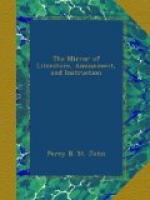Reading at Meals, &c.—Lectores, among the Romans, were servants in great men’s houses, who were employed in reading while their masters were at supper. They were called by the Greeks, Anagnostae. Acroama, was a name given by the Romans to amusing tales, which they recited at their repasts. The Emperor Severus read himself at table. Atticus never supped without reading. Charlemagne had the histories and acts of ancient kings read to him at table. This was a relic of the ancient Greeks, who had the praises of great men and heroes sung to them while at table. Celsus tells us, reading is bad, especially after supper, for those whose heads are weak; but he recommends reading with an audible voice, for such as have weak stomachs.
P.T.W.
* * * * *
Epigrams from the French.
“On peut, en vous voyant, devenir
infidele
Mais c’est pour la derniere fois.”
Chaulieu.
“At sight of thee—each
lover false might prove,
But having seen—no other e’er
could love.”
“Ce monde est plein de fous—et
qui n’en veut pas voir
Doit se renfermer seul, et casser son
miroir.”
“With fools the world abounds—who
would their presence shun
Must break his mirror—or he’ll
there see one.”
T.R.P.
* * * * *
Printed and Published by J. LIMBIRD, 143, Strand, (near Somerset House,) London; sold by ERNEST FLEISCHER, 626, Mew Market, Leipsic; G.G. BENNIS, 55, Rue Neuve, St. Augustin, Paris; and by all Newsmen and Booksellers.



